The tigers' cage: inside China's Qincheng prison
Secrecy veils Qincheng prison, but many of the country's most famous politicians have found themselves on the wrong side of its walls
PUBLISHED : Monday, 06 July, 2015, 4:57am
UPDATED : Wednesday, 08 July, 2015, 1:54am
Angela Meng [email protected]
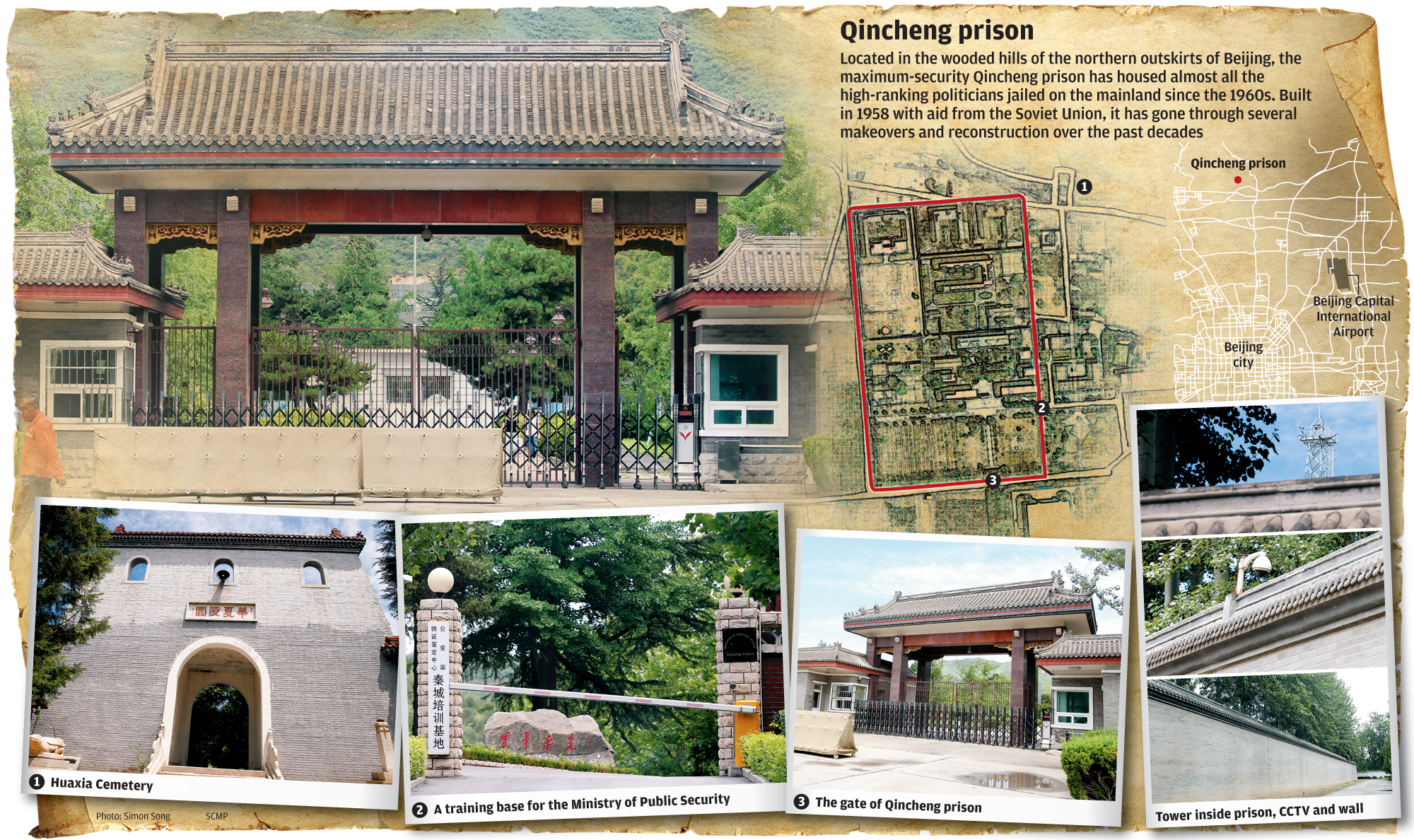
The sound of a familiar cough, from a nearby cell he could not see, tormented Yan Mingfu through some of the darkest days of his seven-year confinement at the notorious Qincheng prison.
It was a muffled sound, perhaps just metres away, yet there was something about it that reminded Yan, who would go to become the head of the United Front Work Department, of his father.
Since all inmates of Qincheng were kept in solitary confinement, Yan was able to console himself only by reasoning that there would be little rationale for a retiree such as his father to be among those persecuted during the Cultural Revolution.
Yet the suspicion - shared in a recently published memoir - turned out to be true. Yan senior died only a few days after his son was disturbed by his coughing. Yan junior found out only after his release in 1975.
Decades have passed since the two Yans were imprisoned within its walls, but Qincheng, a maximum-security prison designated for the detention of disgraced senior Communist Party officials, remains shrouded in secrecy.
Many of the country's most well-known politicians have been kept prisoner in its cells. Among its former inmates are the wife of Mao Zedong, Jiang Qing; Wang Guangmei, the wife of former president Liu Shaoqi; the former aide to late party general secretary Zhao Ziyang, Bao Tong ; the 10th Panchen Lama Choekyi Gyaltsen; the late father of Bo Xilai, Bo Yibo; and possibly even Bo Xilai himself. Bo Xilai's one-time aide, former Chongqing police chief Wang Lijun, is also believed to be kept there.
And it is here that former security tsar Zhou Yongkang , the first Politburo Standing Committee member to be jailed for corruption, is likely to spend the rest of his life.

The gate of China's most well-known Qincheng prison. Photo: Simon Song
But he is hardly likely to spend any time catching up with fellow inmates such as his former ally Bo Xilai - the former princeling party boss of Chongqing sentenced to life for bribe taking, embezzlement and abuse of power two years ago.
The prison is thought to still keep its inmates in solitary confinement, so Zhou is likely to have as little contact with Bo as the two Yans had all those years ago.
Information about the secretive prison - which is set aside for officials of ministerial level or above - is not easy to come by. Unlike other prisons, which are supervised by the Ministry of Justice, Qincheng is managed by the Ministry of Public Security.
"It's the most elusive prison in China, directly controlled by the top of the party," says Wang Zhiliang, a professor at the Shanghai Institute of Political Science and Law who studies the criminal justice system.
The prison, 30 or so kilometres outside of central Beijing in Changping, was built in 1958 with the help of the Soviet Union.
Today, there is no sign outside the main gate, nor is there barbed wire above its high walls, though there are surveillance cameras in the courtyard. Despite the prison's low profile, a guard dashed out when he noticed a Post journalist driving around the outside perimeter, taking video.
With the anti-corruption drive in full force, the prison is probably busier now than ever.
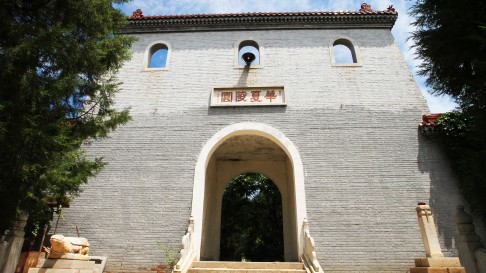
Huaxia Cemetry. Photo: Simon Song
"It's possible that Qincheng is operating at full capacity due to the anti-corruption campaign," said Wang. "Even if that were the case, the Ministry of Public Security has more than enough resources to deal with it."
The anti-graft campaign has used the country's correctional facilities as a warning to senior officials and executives of state-owned enterprises.
The party's Central Commission for Discipline Inspection has sent senior officials to prisons in Beijing and Hebei to see the facilities and hear stories from incarcerated former officials.
According to China Daily, nearly 340,000 officials have visited "Beijing Prison" since the anti-corruption education tours began in 2008.
From the outside, Qincheng might pass for a secret spa retreat. Tucked in the misty mountainside, its red gates are flanked by low surrounding walls and towering white birch trees.
But Yan recalled that inmates could shower only once a month, under close surveillance of the guards. This was also the only opportunity they had to cut their hair and nails. Each cell had a flushing toilet, a basin and a peephole on the door through which guards would speak. Food would be passed through a slot below the hole.
Yan also recalled begging the guards for more food and how grateful he would be on the occasions they gave him extra to keep him from starving.
The Qincheng of today can be very different, at least for some. The prison now contains special sections for "VIP" prisoners.
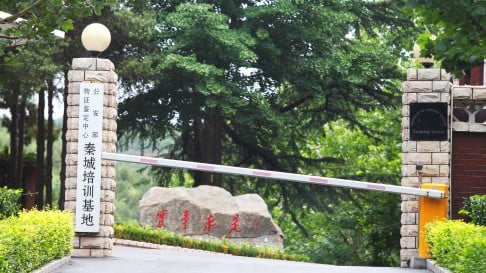
A training base for the Ministry of Public Security. Photo: Simon Song
He Diankui, a former director of the prison's supervision office who worked at Qincheng for more than 40 years, said prisoners were treated according to rank. He even recalls shark's fin soup prepared by a chef from the five-star Beijing Hotel being served.
A report by China Newsweek claimed the most "elite" prisoners enjoyed nutritious meals, even during tough times, and heated blankets in winter.
Sidney Rittenberg, the first American to join the Communist Party of China, was held in Qincheng from 1968 to 1977 after being labelled a spy.
"I was inmate 6832," he recalled. There were "no real names, that's part of the routine in Qincheng. Most of the people held there were so powerful, the aim was to bring them down, to depersonalise them, to tell them they were nobody."
Rittenberg said his cell was six paces long and three paces wide. Metal grills guarded the small window high up on the wall, and there were two lights on the ceiling, one for the day, one for night. His wooden bed was placed across two sawhorses and the keepers would keep watch on the prisoners through the peephole on the iron door.
Meals consisted of thin porridge and soup, usually with no meat or oil, accompanied by coarse cornbread.
"Food is withheld as a means of punishment. One of the lightest and most common punishments is first to starve the prisoner and then give him or her a bowl of very greasy noodles as 'compensation'," Wei Jingsheng, a human rights activist, wrote of his time there.
"Most, of course, become ill as a result and have to miss the next few meals as well."
Wei said that the most common form of torture in Qincheng was a simple beating.
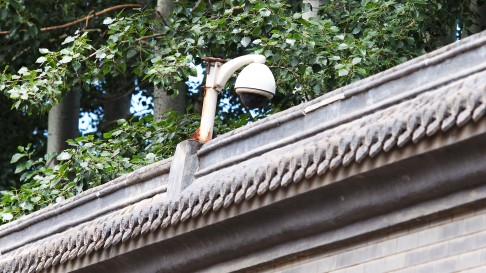
Tower inside prison, CCTV and wall
"The prisoner is summoned and surrounded by a group of men who slug and kick until he is bruised, bloody, and completely breathless," he recalled.
Rittenberg had similar memories. "One night, right after the sleep bell, I could hear in the distance that they were beating a female prisoner. I heard thumping sounds and I heard her screaming and pleading with them to stop, they were shouting at her, 'talk, talk and we will stop'."
Rittenberg's situation later improved, if only slightly.
"After [US national security adviser] Henry Kissinger visited in April 1971, I was suddenly moved to a slightly larger cell," he recalled. "I started receiving really good Chinese restaurant food, like dumplings, and kungpao chicken.
"After the Nixon visit, they hauled me into the interrogation room and asked me if I knew Richard Nixon. Their attitude was noticeably softer, and nicer."
Wang Dan, a student leader, described the prison in his memoirs as "scary and depressing" with "awful" food.
Qincheng's evolution spans four main periods. Up until the 1960s, old Manchu officials, Japanese prisoners of war, and Kuomintang leaders were held there. During the 1960s and early 1970s, most prisoners were held for being "counter-revolutionaries". The "Gang of Four" and its alleged associates were imprisoned in Qincheng from the late 1970s to the 1980s.
The last phase, which loosely spans from the 1990s until today, has seen the imprisonment of many high-net worth, corrupt officials, including former National People's Congress vice-chairman Cheng Kejie, former vice-chairman of China Mobile Group Zhang Chunjiang, former Yunnan governor Li Jiating, former China Construction Bank chairman Zhang Enzhao, and former Guizhou party secretary Liu Fangren.
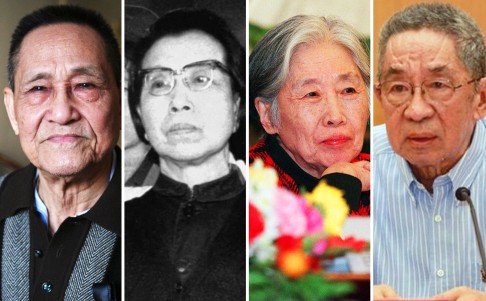
From left to right, Bao Tong, Jiang Qing, Wang Guangmei and Yan Mingfu. Photo: AP, EPA, Xinhua
During the Tangshan earthquake of 1976, Rittenberg recalls waking up and being taken out into the yard. Keepers and guards pitched small tents for each prisoner quite far from each other, and each tent had its own guard.
"He told me he was there to protect me from the earthquake, and pointed to a little door in the outer wall," Rittenberg said. "Right outside that door was a car waiting. He said, if there is an earthquake you'll be whisked to that door and we'll drive you straight to Shijiazhuang ."
Rittenberg was released in November 1977.
Yan recalled inmates being allowed to walk around open-air cubicles for exercise, albeit under the scrutinising gaze of guards on the walls above. After each session the guards would sweep the floor to make sure inmates were not leaving messages for others.
If such traditions continue, the many "tigers" toppled by President Xi Jinping may be living just metres from each other, but they might as well be worlds apart.
Additional reporting by Staff Reporters
